"My Unified Theory of Anti-Semitism," by Gary, the 4,000-year-old man
Hating Jews is not a bizarre psychiatric disorder that afflicts crazy people. It's a survival strategy drawn from Charles Darwin's evolutionary playbook.
{This is PART 2 of my interview with Gary. In PART 1, Gary explained how he has remained alive for four millennia, how he became best friends with the patriarch Abraham, and why the root cause of anti-Semitism is woefully misunderstood.}
Survival of the Fittest
Alan: What is your unified theory of anti-Semitism?
Gary: I call it Narrative Darwinism. Or: Survival of the Fittest Story. Here’s my short definition:
Jews carry with them a theory of change embedded in a 4,000-year-old Story that says: People are created in the Divine image… Human history has a point and a purpose… Progress is possible… Hope is not a mirage… Truth and The Good exist (although they are often difficult to define)… and: You cannot arrive at your desired destination, individually or collectively, unless you remain devoted to each other and to (the character we call) G*d.
This Jewish Story is one of many “master narratives” that help human beings make sense of themselves and the world. (See also: Christianity; Islam; economic and cultural Marxism; scientism; social Darwinism; the Enlightenment and its various liberal democratic offshoots… just to name a few.) When these stories intersect, they can complement each other, or at least co-exist in a spirit of mutual toleration. But often this narrative collision exposes painful contradictions: If that other guy’s Story is true, then my Story must be nonsense, which means I’m living a lie.
As people struggle to resolve these contradictions so their worldview still makes sense, temperatures rise. With the narrative pillars of their identity showing some cracks, people get frightened. Or angry. And soon they look for ways to resolve this narrative and existential contradiction, once and for all: The best way to kill a competing Story that disturbs my emotional equilibrium and my worldview is to marginalize, silence, expel, or extinguish the people who tell that troublesome Story.
This is Narrative Darwinism, which is the root cause of anti-Semitism.
Alan: Okay… slow down. What exactly is this Jewish “theory of change” that’s “embedded in a Story”?
The Jewish Story
Gary: At the risk of annoying your readers, let me begin with a quote that you post on this Substack with monotonous regularity:
Alan: But progress existed long before the Jews showed up. The Pyramids of Giza, for instance. No one had ever constructed something that big and complex until the Pharaohs did. The Babylonians developed sophisticated lunar calendars, advanced city planning, a medical diagnostic manual, and the Code of Hammurabi. The Egyptians and the Babylonians didn’t need any Jewish “connected narrative of history” or some abstract “idea of progress” to make actual progress.
Gary: That’s true. The Egyptians and Babylonians were changing the world, but to what end? What were they trying to create? What were the goals of their empires?
Alan: To maintain the divine order. To sustain the cosmic balance. To establish a stable and prosperous kingdom through law, order, and military might. Those sorts of things.
Gary: Those are all noble goals. But what did those empires teach us about people — about our character, relationships, ethics, mutual responsibilities, justice, love, history, and meaning?1 Was the Egyptian or Babylonian “divine order” static, or did it change over time? Should we learn something from history so we don’t repeat the same mistakes? Do we believe in ethical progress, or are we ultimately the children of Thucydides, destined to make the same errors over and over again?
Patient Zero
Alan: Instead of talking about abstract ideas and philosophy, let’s get specific. Take me back in time, and tell me the first moment you spotted anti-Semitism in the wild.
Gary:
Year: 1972 BCE
Place: King Shulgi Middle School, Ur of the Chaldees
Day: the 4th of Nabu
Time: 10:23 am
Gary: As you know from part 1, Abraham was my all-time best friend. He was also the valedictorian of our eighth-grade class, so he was the student speaker at our middle school graduation. I don’t have an audio recording of his speech, of course, but I remember him saying something like this:
… So, on this day when we look back on our accomplishments, we also look forward to an uncertain future. Now, I realize “uncertain future” might sound strange, especially since our teachers have always taught us that history is circular, like the seasons. The future resembles the past: What once was will be again, but with bigger ziggurats.
The problem is, this idea — which, in roughly 1,500 years, will inspire Thucydides’ History of the Peloponnesian War — is wrong. Our teachers are wrong. Our ancestors were wrong. I stand before you today to testify that human history does have a point and a purpose, and so do each one of us.
Ask yourselves: Why do we believe that King Shulgi is the primary link between humanity and our god, Marduk? Why do we believe that history is cyclical rather than linear? Why do we believe that the only real improvements we’re ever likely to see are improvements in our tools and technology? Is our purpose in life to build more efficient irrigation systems, bigger ziggurats, and faster iPhones? Is that why we’re here?
I believe there’s another way. A better way.
I believe that another future beckons — a future far grander than the expansion of our empire.
I believe there’s a G*d greater than Marduk who speaks not through the stars or omens in a priest’s hand, but directly to me — and to you — a G*d who promises a better future for us all.
I also believe that our civilization is built upon quicksand — upon a set of ideas that will eventually collapse. Perhaps not today, or next week, or next year, but our end time is approaching. Babylon will implode. So will Egypt, Greece, Rome, Persia, the Umayyads and the Ottomans, the Aztecs and Incas, the Nazis and the Soviets, and many other empires you’ve never heard of. That’s why we need to reassess our values, our worldview, and our stories. Because if we reimagine who we are and who we might become, as individuals and as a community, then we have a chance to build a better future for our…
Gary: … and that’s when the heckling began and the bricks started flying.
Alan: Abe kinda punched them in the gut, didn’t he? Telling people they are living a lie never ends well.
Gary: That’s why Abe packed his bags and hit the road. He realized that his new worldview could never be shared through speeches, debates, books, podcast interviews, or spittle-flecked screeds on Substack. He would never convince anyone that G*d existed by talking about it. He could only share his insight about human history and the human condition by becoming the change he wanted to see in the world. By living the dream. Or, as The Great Storyteller once said: “Show, don’t tell.” So Abraham stopped talking and started walking.
Alan: Ah, ok… I get it: By leaving home to pursue this dream of a better world, Abe is… beginning a new Story?
Gary: Exactly. Abraham was the Isaac Newton of human history, but instead of laying the foundation for classical physics, Abe discovered a new metaphysics. And while gravity is a physical law we can’t abolish — it exists, whether we like it or not — Abe’s metaphysics was, is, and forever will be a choice. A decision. A commitment and a covenant embedded in a Story.
Abraham and his descendants could have abandoned this narrative at any point, and so can we. But then we’d confront a monumental challenge: What Story might be a worthy replacement? What other master narratives offer people some hope that tomorrow might be better than today?
“Workers of the world! You have nothing to lose except…”
Alan: How about a secular narrative like Marxism? Karl believed in progress and a better world, just like Abe did, but without the G*d mumbo-jumbo.
Gary: You beat me to it! Marx took the Biblical vision of a redeemed world, removed the religious stuff, added some Hegelian dialectics, and blended it with his own messianic fantasies to create a Story about the struggle between the proletariat and the industrial bourgeoisie, which would one day lead to a workers’ paradise. Marx’s vision, his Story, launched countless revolutions.
Alan: “Where there is no vision, the people perish.”
Gary: You know that’s from Proverbs 29:18, right?
Alan: So what? It’s true. And Marx had a vision without relying on a sky god or any childish superstitions.
Gary: I’m going to overlook that cheap shot and remind you of what Marxism spawned in, say, the Soviet Union. The Communist Party was telling one Story about the workers of the world uniting, while many Soviet Jews were still telling themselves the Story they had learned from their parents — the one about Moses and Pharaoh, slavery and freedom, covenant and responsibility. The contradictions between these two narratives were obvious and eventually irreconcilable — the Revolution could have only one Party, one Pharaoh, and one Story, which is why the Communists persecuted the Jews, who, over time, demanded the right to emigrate.
This is Narrative Darwinism.
Gary: … I should add that in December of 1991, the Soviet Union collapsed onto the ash heap of history after just 74 years, while the Jews and the nation of Israel are still with us and going strong, 4,000 years since Abe and I walked out of Babel. The Jewish Story, in Darwinian terms, has proven to be exceptionally fit.
Alan: What about cultural Marxism?
Gary: After the collapse of the Soviet Union, Marxists needed a different narrative. So, they replaced the economic struggle with cultural ones — men oppressing women, Whites oppressing Blacks, cis people oppressing queers, colonists oppressing the colonized, and Zionists oppressing everyone and everything, including the Palestinians.
Alan: So… you’re saying that when members of Black Lives Matter demonstrate against the “Zionist entity,” they are seeking an evolutionary advantage in the Darwinian struggle of their Story vs. the Jewish one.
Gary: Yes, I think so.
Alan: But members of BLM would never say that! They would insist that supporting the downtrodden and oppressed is simply the right thing to do. You’re imposing an abstract evolutionary theory on something quite simple.
Gary: So did Charles Darwin.
Alan: Okay, how about another example?
The Christian Story
Gary: My other examples all follow the same basic Darwinian dynamic of Story vs. Story. For instance, the Christian narrative, as told by Matthew, Mark, Luke, John, and the Apostle Paul…
Alan: But that’s the Abraham Story, continued.
Gary: Not quite. Christianity is the Abraham-Isaac-Jacob-Moses Story plus the dramatic concluding scene at Calvary. The 2,000 years following the Crucifixion, in Pauline terms, are just commentary and footnotes on the Main Event. Meanwhile, the Jews walked away from the rubble of the Second Temple and into exile, continuing their sojourn and Story without Jesus.
Put another way: For Christians, the crucifixion of Christ is the climactic chapter of G*d’s redemptive Story of both the Jews and all of humanity. Jesus is The Way, The Truth, and The Life. Christ as the Ultimate (Theory of) Change. But for Jews, history didn’t end two thousand years ago, the world was not and is not redeemed, and so the Jewish Story goes on. The problem arises when the Jewish and Christian narratives collide, and the contradictions between them become too much to bear. We both can’t be right, so one of us must be wrong. At that juncture, someone has to go.
Alan: So, the expulsion of the Jews from Spain — that’s Narrative Darwinism, Roman Catholic edition?
Gary: Yup.
Alan: What about the Protestants?
Gary: That collision was not much different. Martin Luther wrote an essay in 1523 called “That Jesus Christ Was Born a Jew,” in which he argued against the harsh persecution of Jews by the Catholic Church. However, as the years passed and his hopes for mass Jewish conversion failed to materialize, Luther knew his Reformation Story didn’t have universal appeal. So, in 1543 he wrote a treatise called “On the Jews and Their Lies,” in which he described Jews as “a base, whoring people” and accused us of blasphemy, usury, and being possessed by the Devil. He also encouraged German princes to set fire to synagogues and Jewish schools, to forbid rabbis from teaching under pain of death, and to confiscate their money and property.
Alan: Evidently, there wasn’t enough room for two Stories in 16th-century Germany.
Gary: Or 20th-century Germany. If Luther was the shot, Hitler was the chaser…
The Nazi Story
Gary: Hitler was evil, sure, but what a storyteller! His narrative of Change hinged on racial struggle, in which Aryans were destined to rise and create a new empire — a Third Reich that would dominate the world for a thousand years. But the glorious destiny of the German people was threatened by the Jews, whose very existence, Hitler said, would corrupt and destroy Aryan purity. The Jewish Story was seen not merely as a competing narrative and theory of change, but as an existential threat that had to be eliminated for the German racial Story to triumph.
Alan: The Jewish Story vs. The Nazi Story — one of them had to go. Narrative Darwinism.
Gary: Right. I’d also add this gem from historian Tom Holland, who explains why Hitler also hated the Christian Story, which he blamed on… the Jews.
The Islam Story
Gary: What the Christians tell the Jews — “we don’t replace your Story, we complete it” — is precisely what Muslims say to Christians. Muhammed takes Jesus off the Cross, demotes him from Son of G*d to one of many prophets, and then declares himself the final prophet and the Koran to be the final, perfect revelation from Allah Himself. For Muhammed’s Story to come true, everyone everywhere will eventually need to acknowledge the Truth of Islam.
Alan: It looks like the Muslims are off to an impressive start:
Gary: Islam, much like Christianity, is a global religion with global ambitions. According to that narrative, Islam is destined to expand, not contract. So, the creation of a Jewish nation-state on land that once was part of the Islamic caliphate — that’s a political, geographic, and theological stick-in-the-eye to Muslims who see “the Zionist entity” as hard evidence that Islam’s Story is moving in the wrong direction.
Alan: So, the Israel-Palestine conflict isn’t about real estate. It’s about competing narratives.
Gary: Indeed it is. If Islam can obliterate Israel and the Jewish Story, they will be one step closer to creating a global narrative monoculture — one Story to rule them all.
Alan: That sounds totalitarian and anti-Semitic.
Gary: That’s because it is totalitarian and anti-Semitic.
“Let there be Stories….”
Gary: Here are a few more examples of why the root of anti-Semitism isn’t baseless hatred or mass psychosis, but an all-too-human struggle for meaning and narrative survival.
Liberal democrats tell the Enlightenment Story in which Reason and the “discovery” of human rights in the 17th and 18th centuries have finally overcome the darkness and superstitions of the Church, Biblical tradition, and the Divine call for human responsibility. The Biblical Story (writ large) might be tolerated, but it will no longer occupy center stage: Believe whatever myths you’d like, but keep them to yourself.
The state of Israel is the modern incarnation of one of the Bible’s oldest Stories — the one Abraham began on his journey to the Promised Land. It’s a narrative in which Israel has one G*d, but G*d has many people who will one day sit peacefully beneath their own vine and fig trees. It’s a Story that is both universal and particular. By contrast, the liberal vision tends to be aggressively universal (e.g., human rights for everyone everywhere). This is why France, the UK, and Canada are on the cusp of recognizing a Palestinian state: If the liberal, secular, universal narrative is going to live, then the particular, religious, Israeli narrative must die. Palestine is the poison pill.Scientists tell a Story about a physical world that has no metaphysics: In the beginning was The Big Bang, and everything else followed naturally. So why do we need Jewish (or Christian) meta-physicists who drone on about meaning and ethics? In this new material and mechanical dispensation, there is only one commandment: Trust the Science.
Unitarian Universalists try to combine the wisdom of all metaphysical traditions into a syncretic anthology that says “All Stories Are Good (or Most of Them Are),” which isn’t really a Story at all. And since these Unitarians are universalists, the particularity of the Jews and Israel pose a problem. Someone or something has to go.
The United Nations General Assembly has adopted 140 resolutions criticizing Israel since 2015, compared to 68 resolutions passed against all other countries combined. Why? The short answer: the U.N. has been trying to hijack the Jewish Story for 75 years.
Read the full explanation here.
Environmentalists embrace what you might call a global, Gaia-focused narrative, which is science and naturalism plus a dash of neo-pagan spirituality. (Greens often talk about Mother Earth; the Bible says the Earth is our sibling.) But the Gaia Story has sputtered in recent years, which makes people like Greta Thunberg anxious. So where does she channel her energy now?
“It was not supposed to happen this way…”
Gary: I could give you many more examples, but I’ve probably gone on long enough.
Alan: Not a problem! Before we wrap up, any final thoughts?
Gary: Just one…
Back in 1987, when Tom Friedman was the Jerusalem bureau chief for the New York Times, he wrote a fascinating article titled “The Focus on Israel.”
“Why,” he asked, “is Israel so often the focus of news?” Why does Israel house one of the largest foreign press corps in the world, with roughly 350 news organizations permanently represented in Jerusalem and Tel Aviv? Why aren’t there as many journalists in, say, Addis Ababa? Or Buenos Aires? Or Wellington, New Zealand?
Friedman offered a variety of possible answers, but here’s the one that stuck with me:
Gary: I think the existence of the Jewish state, with Jerusalem as its capital, rings a note in the subconscious of anyone who struggles with the same questions that Abraham asked when we were 8th-graders at King Shulgi Middle School: Who am I? Why are we here? Why do we worship Marduk or Baal or technology or _______? What is “progress,” and is it possible? Is human history linear, or was Thucydides right that tomorrow will be much like today? Are we created in the Divine image, or are we just apes with iPhones? In the end, is Hope a mirage? Is G*d?
By asking those questions — The Jewish Question(s) — in public 4,000 years ago, Abraham enraged his classmates and his neighbors… and anti-Semitism was born.
Alan: But wait! It sounds like you just disproved your thesis: Abe said Progress was possible 4,000 years ago, but anti-Semitism is the same now as it was then. Nothing has changed. Abraham was wrong. Your unified theory is nonsense!
Gary: Ahhh… but you’re missing the most essential point.
Alan: Which is?
Gary: Abraham was the only person talking about hope and progress 4,000 years ago. Now, everyone can speak that language. The problem is, our many competing visions of progress and change are embedded in dramatically different and often contradictory Stories. And so, as I said at the top:
The best way to kill a competing Story that disturbs my emotional equilibrium and my worldview is to marginalize, silence, expel, or extinguish the people who tell that troublesome Story.
This is Narrative Darwinism, which is the root cause of anti-Semitism.
Alan: Are we destined to keep arguing and killing each other over our Stories until we destroy everyone and everything?
Gary: Are you asking me how this Survival of the Fittest Story ends?
Alan: Yes.
Gary: G*d only knows. But I do know three simple truths:
We have free will, which makes us — all of us — The Choosing People;
The Story isn’t over yet; and…
The next chapter is ours to write.






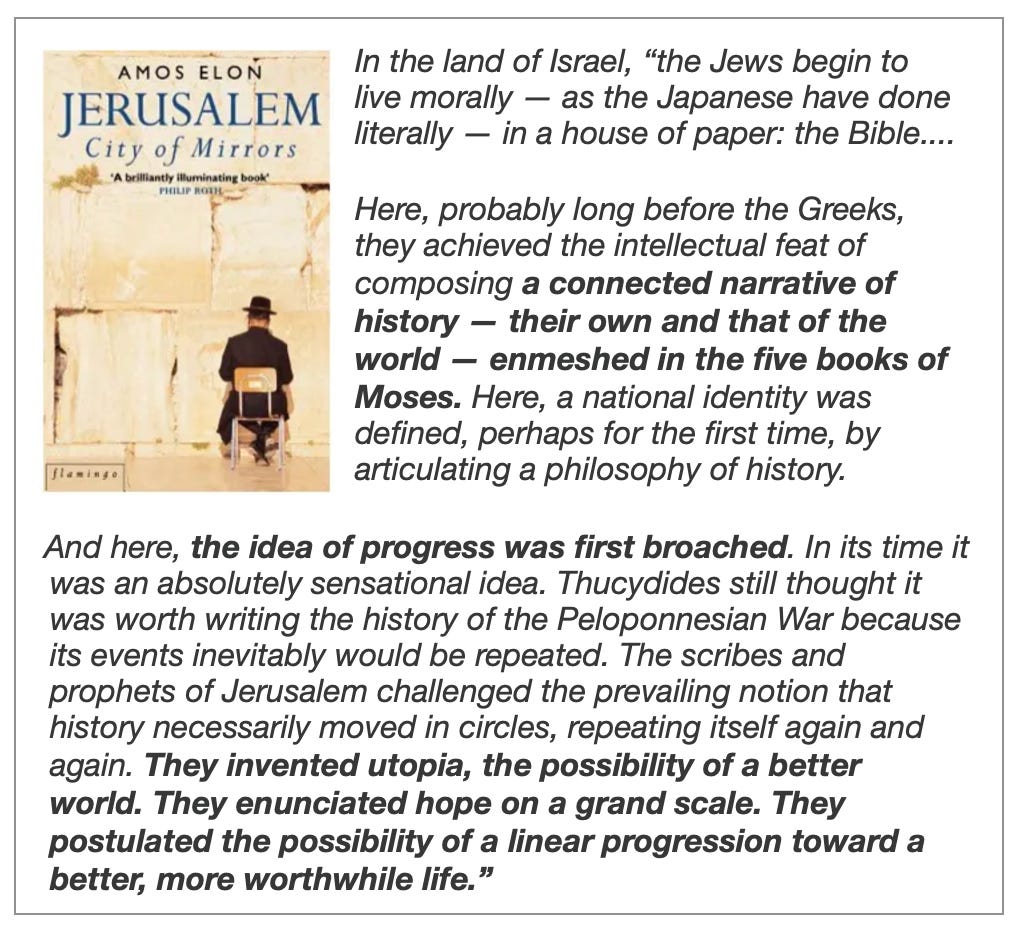
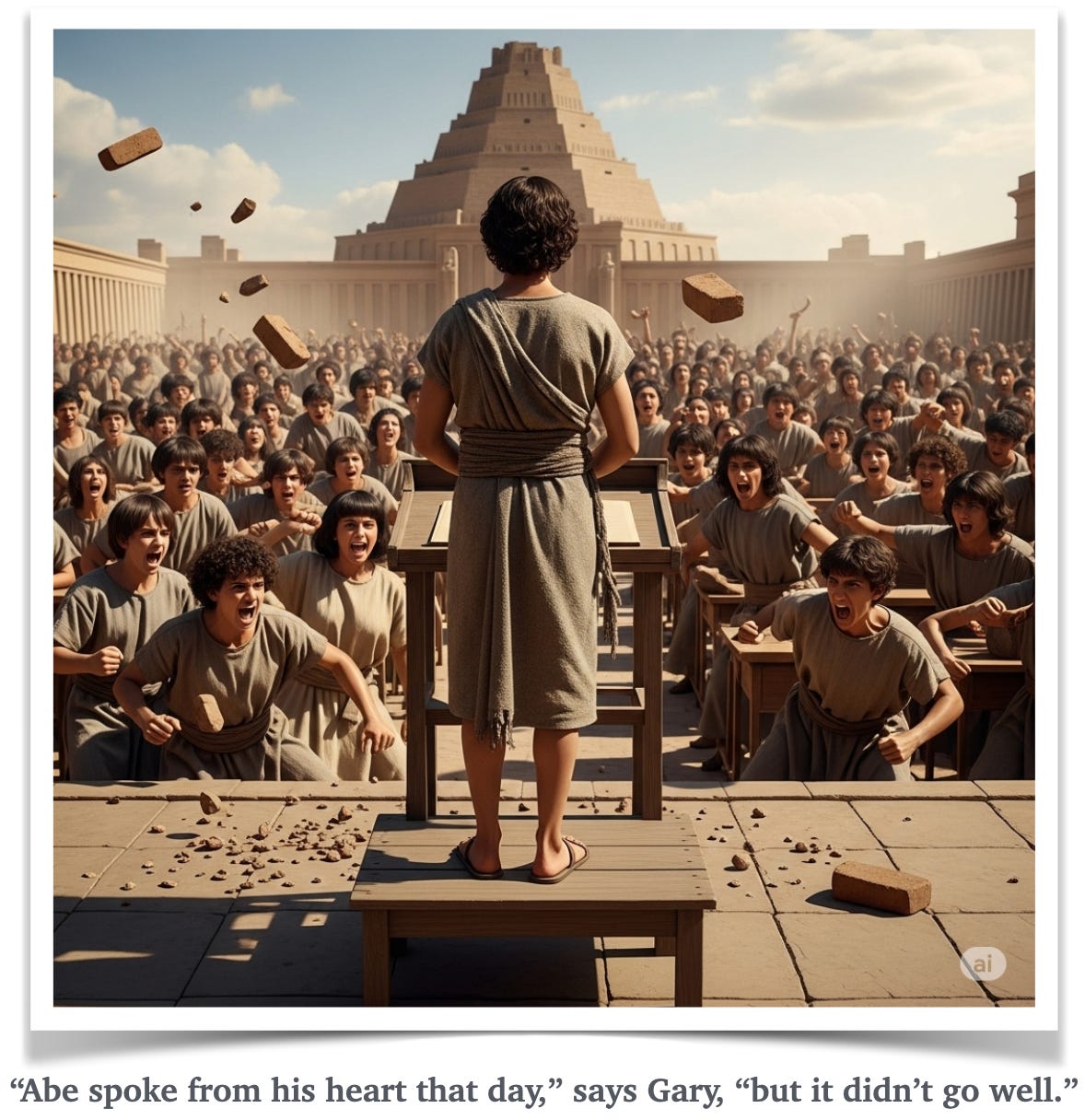



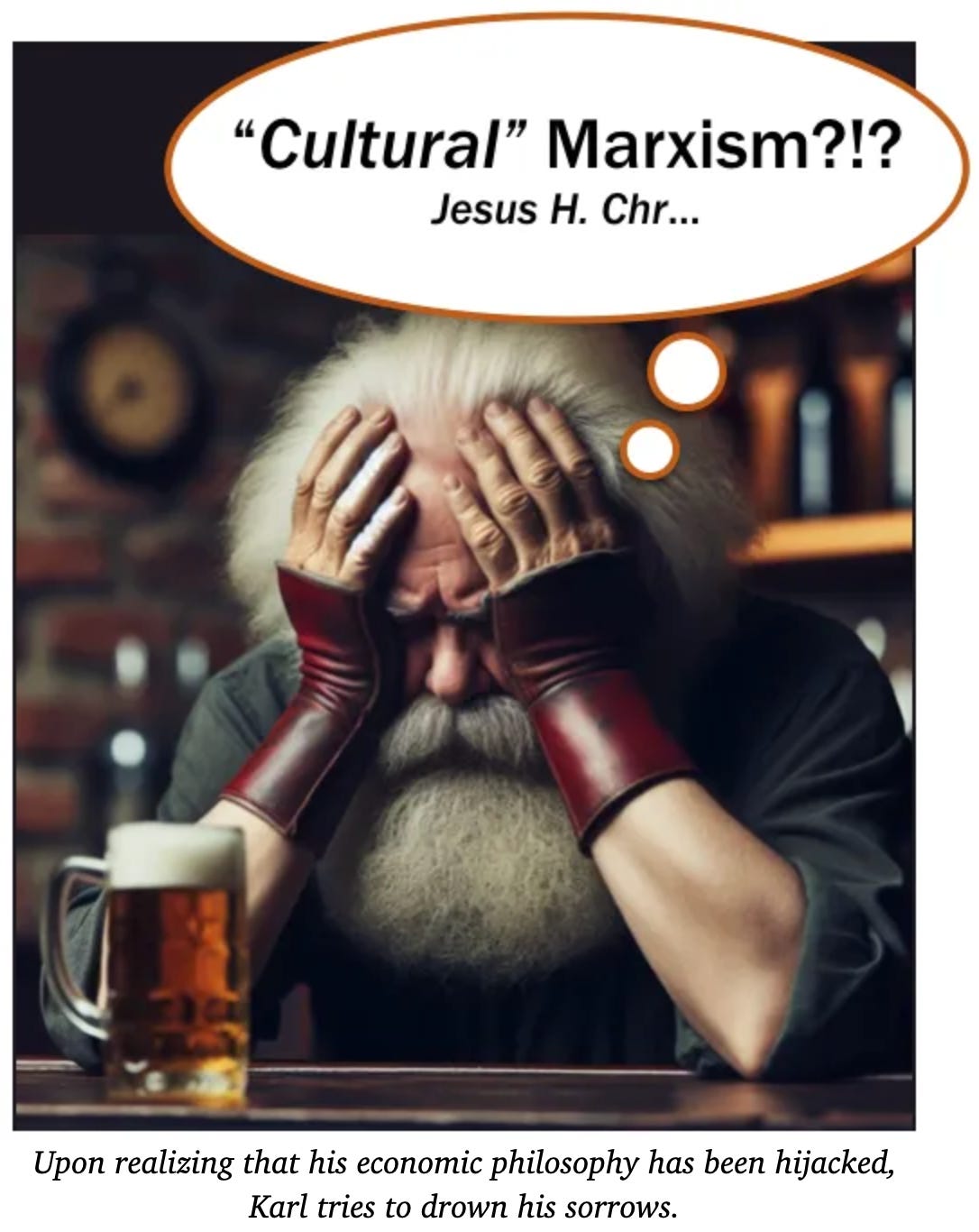
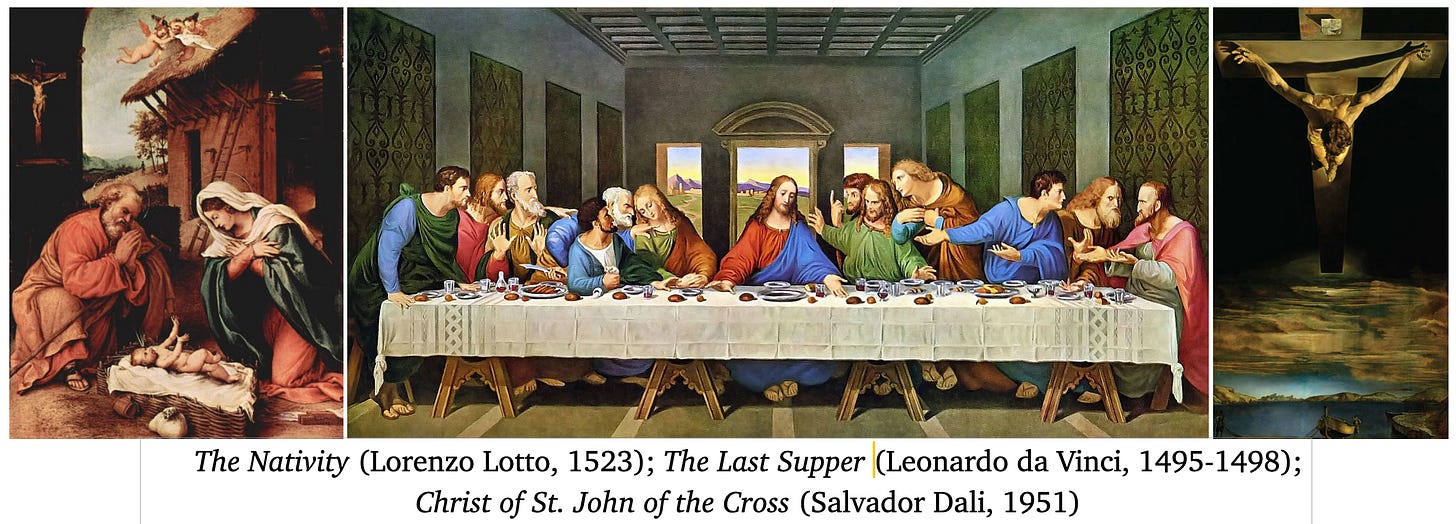

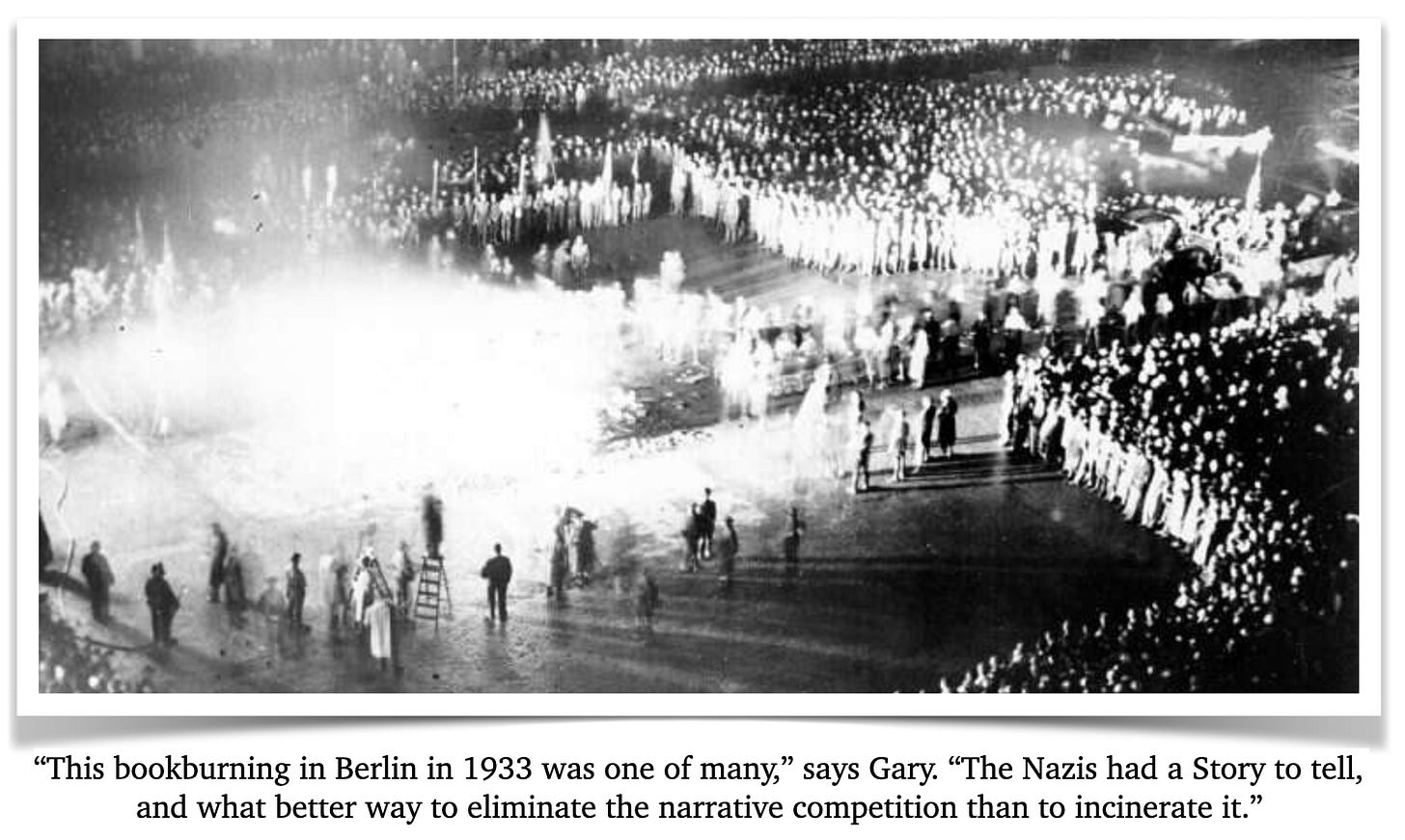

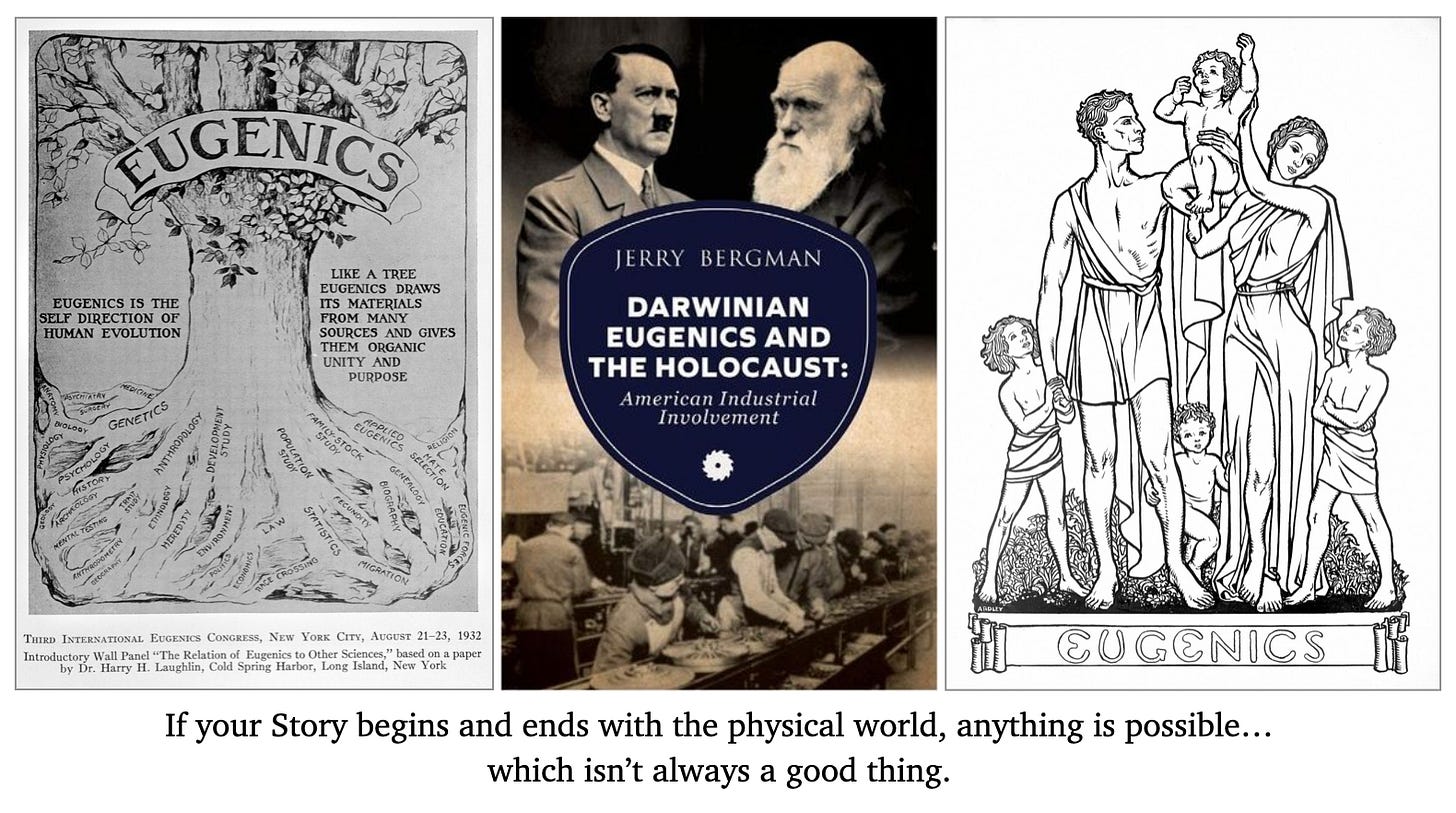

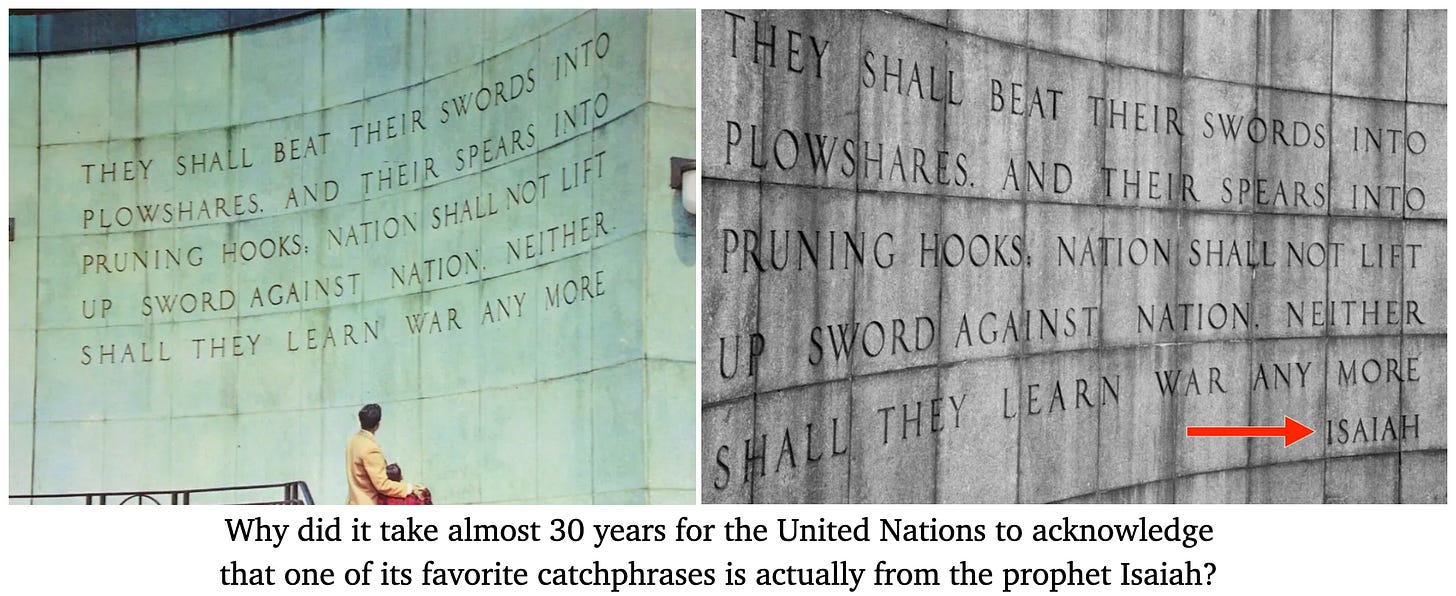




Hi Alan, it is an absolutely outstanding piece of writing. Your unified theory has considerable merit. In some ways it is similar to that advanced by Dennis Prager and Joseph Telushkin in their book Why The Jews. I am also advancing (and have indeed advanced) a very similar theory only where you use the word "narrative" I explicitly call it "religion". I'll be expounding on this in my forthcoming book The Greatest War (stay tuned...just a couple more months). I think the argument's weakest link may be how heavily in leans into to very Jewish belief that we invented everything. My ears may be particularly acute to this as I live in a non-monotheistic part of Asia where the biggest religion is Taoism and where it is considered a fact that the West has little idea about anything, never mind being right about anything. Congratulations on a truly terrific piece.
Outstanding.